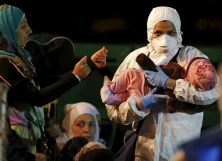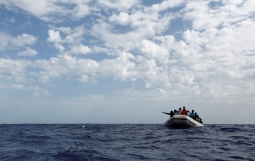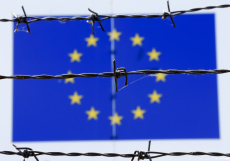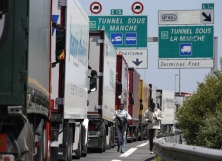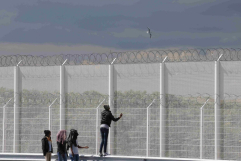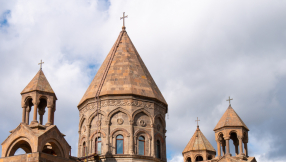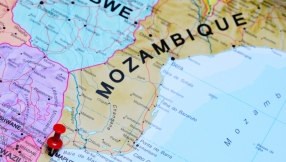The simmering Calais migrants crisis has boiled over. The M20 is closed and more than 6,000 lorries are waiting to cross to France. Holidaymakers are facing delays and cancellations. Local people say their businesses are suffering. Haulage firms are pulling out of continental travel. There is talk of a shortage of groceries in British shops.
And that's not the half of it. In the Calais region, the French authorities are unable to cope with the migrants who are making increasingly desperate attempts to get to Britain. People are dying from accidents and disease – and still they come.
The crisis represents failure at so many levels that it's hard to know where to begin. Above all, however, it is the failure of the British and French governments to demonstrate political courage, human compassion and basic competence that is responsible for the present situation.
We could start with Libya, though.
The 2011 uprising against Colonel Gaddafi placed Western powers in a difficult, though not impossible situation. It could tacitly support a particularly noxious government by refusing to back the rebels, or it could assist in its overthrow by a limited military intervention. Media stories of the atrocities committed by the regime created an irresistible pressure for the latter and NATO air strikes helped ensure victory for the rebels.
It proved a classic example of the triumph of hope over experience. Libya's government rapidly fell apart and it is now a failed state. The relevance to Calais is this: while Libya was intact, it was able to police its borders and limit migration across the Mediterranean. Now it can't, and the trickle has become a tidal wave – more than 137,000 so far this year, from Syria, Eritrea and other countries, facilitated by criminal gangs making fortunes out of their misery. Thousands more have drowned on the way.
These, however, represent only a fraction of those who have migrated, for whatever reason. Many others choose overland routes. Many asylum seekers – and not all migrants can be defined as asylum seekers or apply for asylum – head for Germany, which in 2014 had more than 200,000 applicants. Sweden's next, with 81,000, then Italy, France and Hungary. Britain is way down the list, with only 32,000.
This is, by all historical standards, a major crisis in itself, representing the largest population flow since the end of the Second World War. But it's a crisis on a geopolitical scale, and Britain and France can only contribute to an international solution. Calais, though, is local.
The crisis: why Calais matters
There are, according to best estimates, between 3,000 and 5,000 migrants there, quite trivial in the scheme of things. Yet their strategic location at a border pinch point has meant that they can have a disproportionate impact on cross-Channel trade and traffic. And with increasing numbers, and increasing desperation, suddenly they matter.
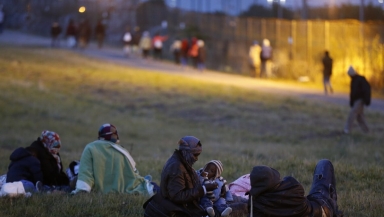
Alongside this there are conflicting undercurrents of unease. Some people fear a "swarm" of unwanted migrants overwhelming Britain's fragile defences in a sort of mass people movement. Others are genuinely sorry for people who are clearly in a desperate position, though they aren't sure what to do about it.
But here's the thing: it's out of these competing attitudes that policy is made, and policy, so far, has been a shambolic failure.
Firstly, France has failed. It has all the resources of a rich first-world country to draw upon, and its response – at a humanitarian and organisational level – has been lamentable. It has not deployed enough security staff. It has not provided safe accommodation, basic food and healthcare for the migrants. (A government-supported "Jungle Two" camp on wasteland outside the town with some toilet and other facilities has been branded an 'intolerable humanitarian scandal' and a 'government-sanctioned slum' by activist groups.)
France has not taken the initiative in detaining migrants, rigorously investigating their backgrounds and stories, processing asylum applications and deporting those who do not qualify.
Let's not imagine that this is simple. Migrants who want to come to Britain don't want to be deported. So they'll refuse to state which country they came from, making it impossible for them to be sent back; and if they're removed elsewhere, they'll simply try again. However, France has so far not been up to dealing with it.
Britain is more attractive than France
There is, however, a more fundamental French problem. The support France gives to asylum seekers is in theory broadly comparable with what Britain gives.
In Britain, it's £72.52 a week for a married couple. Single people of this age get £36.95. This is not much, frankly. According to the Refugee Council, Britain's asylum system is "very tough" and often dysfunctional.
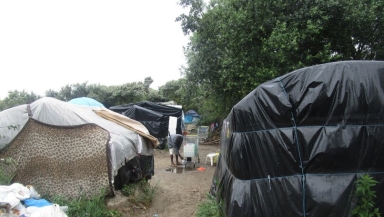
In France, the allowance for adults was 11.45 euros (£8.13) a day or £56.82 a week. Against this, the French state provides no money for children, so those with children would be better off in the UK.
However, while both Britain and France say that they'll provide accommodation to asylum seekers, in practice many in France are simply told that there's nothing available: according to UNHCR, the authorities "claim there are not enough places and priority should be given to families with small children".
There are other reasons why Britain is seen as a more desirable destination than France, among them a stronger economy with much lower unemployment, more migrants having English language skills than French, and the existence of established expatriate communities. They're also, according to the director of Kent charity Seeking Sanctuary – of which more below – the products of successful propaganda by the British Council, which runs extensive programmes in developing countries promoting British values and the English language.
But whether Britain's streets are paved with gold or not, migrants know that if they make it across the Channel they'll stand a better chance of a decent life than if they stay in France.
The response: principled and less principled politicians
The response of British politicians has been shamefully weak. Public statements from the Prime Minister and other members of his party have betrayed an instinctive hostility toward the migrants and a determination to keep them out at all costs. David Cameron said yesterday, in remarks that were widely condemned, that the UK would not become a "safe haven" for migrants, saying the situation had been caused by a "swarm of people coming across the Mediterranean, seeking a better life, wanting to come to Britain".
Conservative MP David Davies – the member for Monmouth, not the more famous member for Haltemprice and Howden – told Radio 4's Today programme that British troops should go into migrant camps in Calais to move people "back to Africa or the Middle East". He said they should be placed in (humanely-run) camps and that benefits in the UK should be cut to make Britain a less attractive place for them.
Referring to Cameron's comments, Refugee Council spokeswoman Lisa Doyle said: "It's extremely disappointing to hear the Prime Minister using such irresponsible, de-humanising language to describe the desperate men, women and children fleeing for their lives across the Mediterranean Sea.
"This sort of rhetoric is extremely inflammatory and comes at a time when the Government should be focused on working with its European counterparts to respond calmly and compassionately to this dreadful humanitarian crisis." Labour's interim leader Harriet Harman said Cameron "should remember he is talking about people and not insects" and called the use of "divisive" language a "worrying turn". Aside from this, Labour – and its four leadership candidates – have said remarkably little, leaving it to the Liberal Democrats' Tim Farron to argue that Britain should "accept our fair share of refugees".
Cameron's answer, announced today, was that extra sniffer dogs and fencing will be sent to Calais and that MOD land in Kent would be made available to help with traffic flaws.
Farron – an evangelical Christian who underwent a hostile media inquisition over his presumed views on homosexuality on his accession to the leadership – said on Wednesday, "If you don't give people hope, they will resort to desperate measures. We are treating this as a security issue, but primarily it is a humanitarian one."
Farron is one of the few politicians to have the courage to make a point that should be obvious. The migrants – some of them with grounds for asylum, some not – are without exception in the direst need. They have been driven, either by fear of their lives or by desperate poverty, to complete a journey which most readers of this article would not dare to begin. They are problems, but more than that, they have problems.
Farron's is not a popular view. Conservative voters are traditionally stricter on immigration. In the last election, a survey showed that Labour voters wanted their party to be tougher, too. But it's a little heartening to know that the leader of even so marginal a party as the Liberal Democrats can say the right thing.
Kent charity Seeking Sanctuary works with a French charity, Secours Catholique, to take clothing and equipment to the "jungles" of Calais. Its director Ben Bano told me: "These people are not seeking a better life, they're seeking a life. They are traumatised by civil war and by the breakdown of any form of law and order. They are desperate."
What should be done
What, then – apart from dogs, fences and the Army – can Britain do that it is not doing?
First, David Cameron must get a grip on the language he and his parliamentary colleagues use to describe the would-be migrants of Calais. They are not a threat, they are needy people.
Second, Britain should back the EU quota system for migrants, which would see Britain welcome around 60,000 into the country. Popular? No. Politically deliverable? Almost certainly not. But alongside a coherent Libya strategy to reduce the numbers crossing the Mediterranean, it would be the right thing to do. Oh, and that's another Tim Farron position.
Third, while Britain is desperately anxious not to appear critical of the French because of the risk that France will tear up existing agreements and simply move the problem to Dover, it should exert pressure on France to improve conditions for asylum seekers there. This is the reverse of the race to the bottom advocated by some of our politicians.
Fourth, Britain should make immediate arrangements to take some thousands of the Calais migrants in a safe and ordered way and process them on UK soil. Those eligible for asylum should be given it. Others should be deported. Those who refuse to say where they have come from should be detained.
Let's be clear: Calais is small fry. Large numbers of migrants are heading elsewhere in Europe, including Greece, which is less equipped than anywhere else to deal with them, and Italy, which is furious at France's unwillingness to take some of the thousands who head for its southern borders. But four million refugees have left war-torn Syria for Lebanon, Jordan and Turkey.
Against this, Britain's ungracious and paranoid refusal to even to consider that it may have a moral responsibility to those who have risked everything to reach our shores is deeply shaming.
Follow @RevMarkWoods on Twitter.










